

THE MESSENGER
UNIVERSITY OF RICHMOND
Editor-in-Chief
JULIAS. WILLIS
Richmond College Editor
RICHARD HASKER
Rich mon d College Staff
ANDREW SULLIVAN
FLETCHER STIERS
IV estham pton College Editor
DON AGEE
JEAN SAPERSTEIN
IV esthampton College Assoc Ed.
PEGGY CLARK
Westhampton College Staff
FAYE HINES

PAT FULLER
MARY Lou MASSIE
Bus ine ss Manager
HAROLD FLAX
VOLUMELII NOVEMBER, 1944 NUMBER 1
Like the fall of the year times like these we live in slough off worn ideas and institutions and leave bare the trunk and branches of our society. Sudden change tests the underlying strength of our organization and ourselves. Reevaluation of ideas we have thrown at us continually and every period of history has had to key itself for subtle changes and readjustments, but while the wheel of society turns methodically individuals fill their places rhythmically in their set patterns. Now we find cogs missing and new ones in their places in wild confusion. Some of them fit and some stand out in high relief. In any case each part finds that it must refit itself to make the whole pattern move again. It is our responsibility to look to ourselves.
Humanity can be like a great crystal with each being as one of its many facets. Every one of these sides can throw back some meaning to the individual who looks at them all to see himself.
Now that the background of our life is so changed, individuals sometimes stand out in rare grotesques like the caricatures in a Dickens's novel. There are some exaggerated forms in this magazine perhaps. Look about you for if you can be aware of yourself as well as others, you can sooner find your place and make a start at helping to fit the other sections into a more perfect pattern.
What did you find in this first issue of your MESSENGER?Anything or nothing? If you found nothing it has been a waste of time for all of us. On the other hand whose fault is it? A magazine is alive as long as it presents a challenge for each
Thumbnails:
Joel Harnett heads our roster. That is as it should be because he's a dependable sort of person and can always be expected to give a struggling editor something to print. Everyone knows who he is so we don't need to go into that but his short story is something a little new for the MESSENGER. We mean by that that it's really good . On page two we find something produced jointly by Julia Willis, Mother Necessity and the pressure of events. Enough said. After searching through our files of material (I mean of course, after searching for our files of material) and after careful consideration, we selected an article by an interested contributor, J.Harnett Time and space do not permit an extensive description of this author but perhaps you can find a friend on the campus who can introduce you personally to this coming writer. Jean Saperstein next came to our rescue with a short psychological sketch. But then she's a member of the staff, too. Margaret C. Clark and Verda Sletten also contributed in the way of poems. I almost forgot to mention that they are on the staff. Fletcher Stires turned in a book review and is ever faithful with poetry. It occurs to me that he is also on the editorial staff This leaves us with Tom Jones. Again time and space do not permit an adequate description.
What this all adds up to is that it has come to a pretty pass when the editorial staff have to congregate with some typewriters and a bunch of nomsde-plume to put out an issue.
reader either to think or to try to do better. It can also be a medium of exchange between you and your fellow students. If you disagree on an idea, write out your own belief into a story or poem or article. Look through the words written here for some idea and for individuals around you and then bring the publication to life for yourself and others by your own viewpoints and modifications of ideas. The staff of a magazine is merely a superficial structure We are only stage managers for the play of your ideas .
By Julia Willis
By Joel Harnett
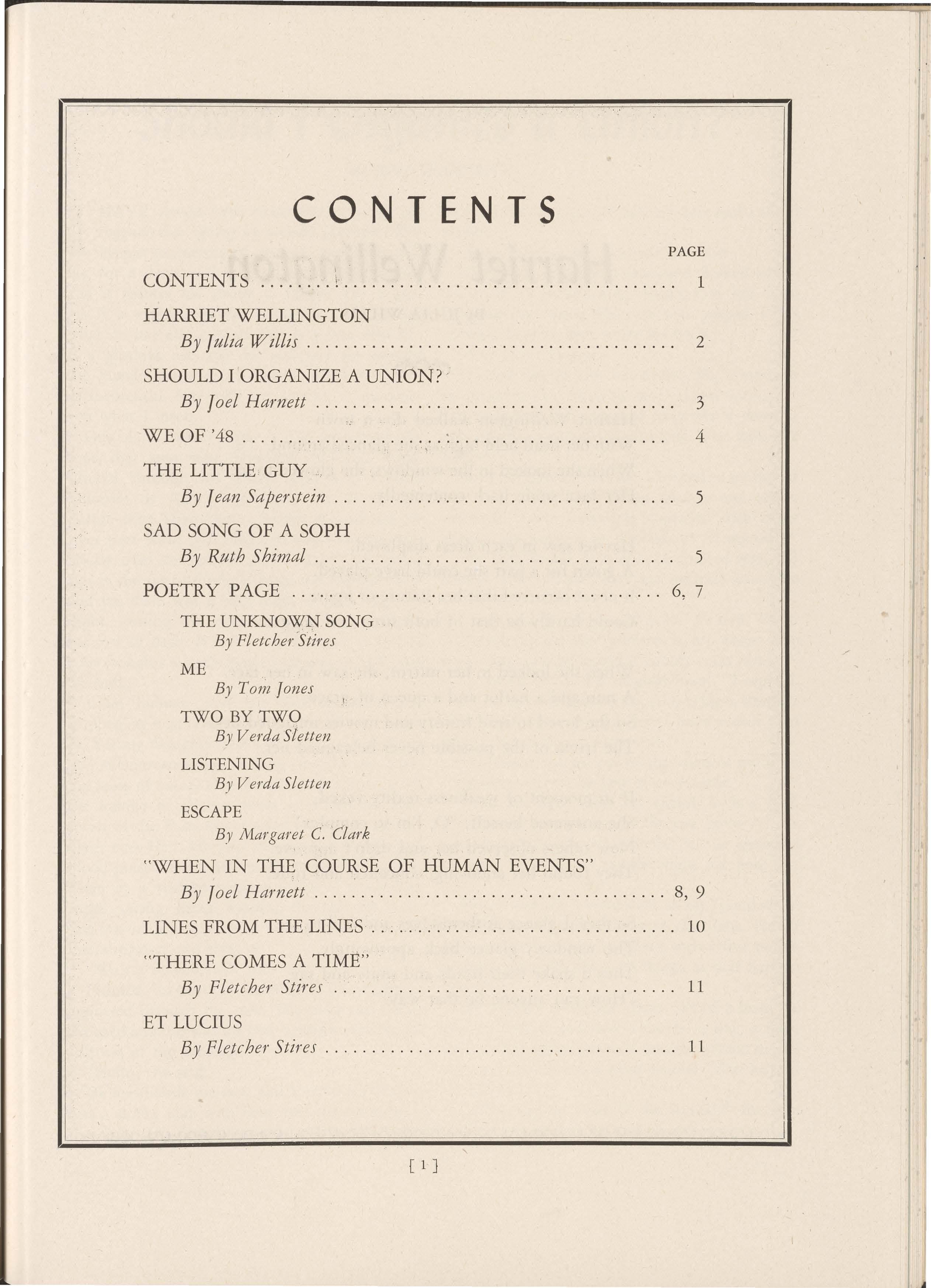
By Jean Saperstein
By Ruth Shimal
THE
SONG By Fletcher .Stires ME By Tom Jones
TWOBYTWO By Verda Sletten
. LISTENING By Verda Sletten
ESCAPE By Margaret C Clark "WHEN IN THE COURSE OF HUMAN EVENTS" By f oel Harnett ......................................
Fletcher Stires
ET LUCIUS By Fletcher Stires
HarrietWellington
By JULIA WILLIS

Harriet Wellington walked down town
i With her head held high as she glanced around.
1}k_ When she looked in the windows, she glowed to see
i Her face smile back contentedly.
1}k_ i i
Harriet saw in each dress displayed, j
1}k_ A gown for a part she could have played.
It never occurred that her stature or figure
Could hardly be that of both siren and begger.
When she looked in her mirror, she saw in her face,
2it A nun and a harlot and a queen of grace. i So she loved to read history and movies intrigued her. j The trivia of the possible never beleagued her.
If in moment of weakness reality vexed,
i She answer~d herself, "O, I'm so complex!"
ff) Now others observed her and didn't approve. i They found her annoying, conceited and rude.
ff) 2it So they'd glance at themselves and nod to see
i The windows glance back approvingly.
1}k_ They'd shake their heads and smile and say,
i "How can anyone be that way?"
1}k_
l
1}k_
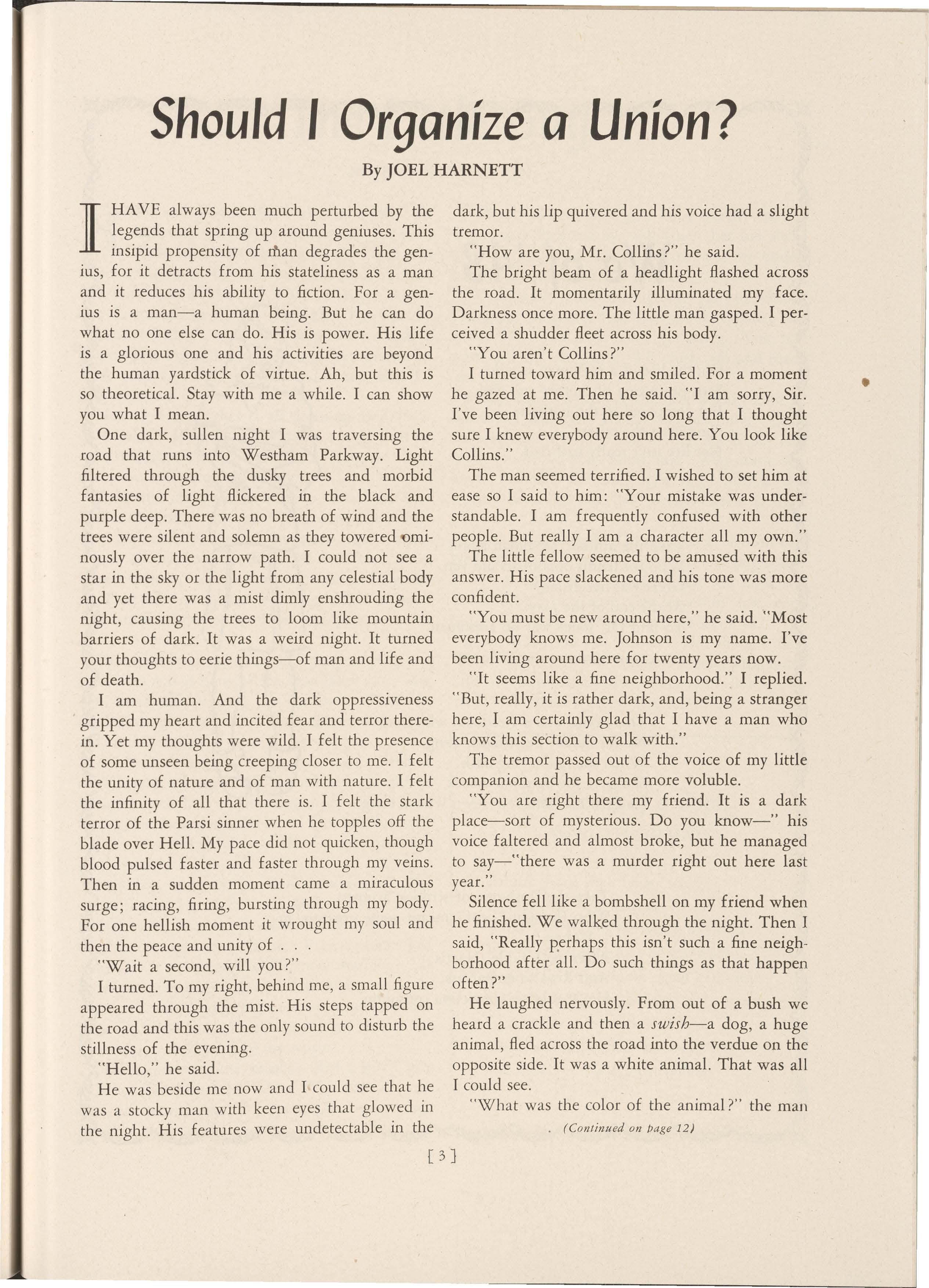
Should I Organize a Union?
By JOEL HARNETT
lf HAVE always been much perturbed by the Jl legends that spring up around geniuses. This insipid propensity of man degrades the genius, for it detracts from his stateliness as a man and it reduces his ability to fiction. For a genius is a man-a human being. But he can do what no one else can do. His is power His life is a glorious one and his activities are beyond the human yardstick of virtue. Ah, but this is so theoretical. Stay with me a while. I can show you what I mean.
One dark , sullen night I was traversing the road that runs into Westham Parkway. Light filtered through the dusky trees and morbid fantasies of light flickered in the black and purple deep. There was no breath of wind and the trees were silent and solemn as they towered ~minousl y over the narrow path. I could not see a star in the sky or the light from any celestial body and yet there was a mist dimly enshrouding the night, causing the trees to loom like mountain barriers of dark. It was a weird night. It turned your thoughts to eerie things-of man and life and of death.
I am human. And the dark oppressiveness gripped my heart and incited fear and terror therein. Yet my thoughts were wild. I felt the presence of some unseen being creeping closer to me. I felt the unity of nature and of man with nature . I felt the infinity of all that there is. I felt the stark terror of the Parsi sinner when he topples off the blade over Hell. My pace did not quicken, though blood pulsed faster and faster through my veins . Then in a sudden moment came a miraculous surge ; racing, firing , bursting through my body . For one hellish moment it wrought my soul and then the peace and unity of
"Wait a second, will you ?"
I turned To my right, behind me , a small figure appeared through the mist. His steps tapped on the road and this was the only sound to disturb the stillness of the evening.
" Hello," he said.
He was beside me now and I could see that he was a stocky man with keen eyes that glowed in the night. His features were undetectable in the
dark, but his lip quivered and his voice had a slight tremor.
"How are you, Mr. Collins?" he said.
The bright beam of a headlight flashed across the road. It momentarily illuminated my face. Darkness once more . The little man gasped. I perceived a shudder fleet across his body.
"You aren ' t Collins?"
I turned toward him and smiled. For a moment he gazed at me. Then he said. "I am sorry, Sir. I've been living out here so long that I thought sure I knew everybody around here. You look like Collins. "
The man seemed terrified. I wished to set him at ease so I said to him: "Your mistake was understandable. I am frequently confused with other people. But really I am a character all my own."
The little fellow seemed to be amused with this answer. His pace slackened and his tone was more confident.
"You must be new around here, " he said. "Most everybody knows me. Johnson is my name I've been living around here for twenty years now.
"It seems like a fine neighborhood." I replied. "But, really, it is rather dark, and, being a stranger here, I am certainly glad that I have a man who knows this section to walk with."
The tremor passed out of the voice of my little companion and he became more voluble.
"You are right there my friend It is a dark place-sort of mysterious. Do you know-" his voice faltered and almost broke, but he managed to say-"there was a murder right out here last year ."
Silence fell like a bombshell on my friend when he finished. We walked through the night. Then I said, " Really p,erhaps this isn't such a fine neighborhood after all. Do such things as that happen often?"
He laughed nervously. From out of a bush we heard a crackle and then a swish-a dog, a huge animal, fled across the road into the verdue on the opposite side . It was a white animal. That was all I could see.
"\'v'hat was the color of the animal? " the man (C on ti nued o n Pag e 12)
We of'48 ·
i\ \ Sans prntection of mother and dad.
Oh, the life of a freshman is sad ,
{ But compared to the bothers ( \/ \ \ She causes the others f'; j Her life isn't really half bad.
.

Take the athletic freshman again • Who for tennis opponents did yen. Great was her dismay
( There once was a freshman who sang )
{ As her buzzer persistently rang. When she ran to ring back l She gave the button a whack '<. l
{ And the trnnsom fell down with a bang . l
( Take the freshmen of striking acumen , 1 { Who thought "prof " meant some creature inhuman.
{ After math under Harris ) And Ross to embarrass, Her theory's a conviction consumin'.
)

The LittleGuy
By JEAN SAPERSTEIN
RAIN and gloom, that's all that's left. To hell with life. What the devil do the poor fools see worth while in it? God that rain is annoying, even the sun has gone back on me. But what should I expect? That's a laugh. Someone do something for me. Me? Ha! The world's against me, that's what. My ideas ain ' t worth a damn. The big shots is boss and they knows it. They pushes us little guys around, damn 'em! To hell with rain
How do I know they ' re all down on me? How do I know? Have I ever gotten a square deal or seen the right side of a bargain? Hell, no! I'm the down and outer, that's what.
Take that job down at Murphy's coal yard that Father Collins got for me. Worked me like a dog, they did, and for what? For them, that's what, them ' s all that counts-them and their kind. Sure I quit! Quit on 'em the next day I did and glad of it. That ain't no square deal for no kind of man. The world ' s down on me I tell you, yeah down on me.
Take this fool rain. Here I am tramping the sidewalks and it rains . Even God don ' t care-aw hell , there ain ' t no God , just the Devil. That's it, the Devil's got everything . Everything but me he's got, and I'm glad of it.
A bit of coffee would do right now. Yeah, I could use it all right, but the other guy ' s got it. Murphy over there in the hamburger joint has it. He's got it locked up, the bum. Not one cup will he give a starving fellow The Devil'll get him, that's what!
Fog, fog, fog, it's the devil in the rain. The damn fog sticks close to me. Ha! that's a laugh! Slimy, sticky fog sticks close to me. Even the fog has the right to insult me. Even it thinks I'm a nobody, a nothing. But I'll show that fog! I'll show this wet stupid rain I'll beat the world to a pulp, I will, and grind its very meanness into these damned sidewalks beneath my feet. I'll spit on the world. I hate the world! . "How about a dime, mister? . Just a small gift to an unfortunate bum?' ' No? Well plod on you fool , you stupid man. I'll get you and your kind. I'll get ya!
"Here you are, lady, give to a worthy cause." You, too? Pass me by, will you? Let me stand here wet and cold. Tramp on me, put me under, but I'll get ya~ Yeah, I'll get ya!
Walk, walk, walk, through the rain to where? I'm goin ' nowhere, that's where I'm goin', nowhere. But just wait till I get there. You just wait. I'll kill the world. I'll crush 'em and mash 'em down .
Huh, that's funny. A kid, just a kid. And at this hour. She's just a littl e one, ain't she? God, she ' s skinny. Collapse that's what she'll do, collapse or die of this damn rain. Why ain't she home? Maybe she ain't got one. Maybe the world's down on her, too. Yeah! That's it, she's like me
" Like a nickel, kid? Go on take it. It's on me. Need some food, ya do. Go on in and buy some. Sure, I'm all right. Do what I tell you now, it's wet and cold out here. Get somethin' hot, peps ya up. Sure, sure I don't need it. Be seein' ya."
Huh, what do you know? The moon's out. Shinin' bright it is, too . Where the devil's the rain? Life ain ' t life without that damn rain. But what's life? Hell, there's a new day tomorrow.
Sad Songof a Soph
By RUTH SHIMAL
I think that I shall never see
A freshman who ' s afraid of me-
A rat who strains her voice to praise The grace and beauty of my ways-
A rat who "sounds-off" loud and clear.
Instead of giggles, smirks, and sneers, I yearn for penitence and tears.
Tho ' rules were made by sophs like me, Indifference, Time must remedy.
Me
By TOM JONES
I look in the mirror and who do I see?
None but the irresistible me.
I go out walking and with whom do I like to be?
No one but the unapproachable me.
I study history and who reminds me of Washington, Jefferson, Lincoln, and Lee?
No one but the unquestionable me.
Though I'm not per£ ect as per£ ect can be, I'm the guy who pleases fifty million women and me.
TheUnknownSong
By FLETCHER STIRES
How often have I heard it, Yet I know not its name, But its beauty I do know and feel. Like the weaver at the loom, Or the spinning of the wheelOver and over it goes, Growing more beautiful and complete, Then only to be lost for a while.
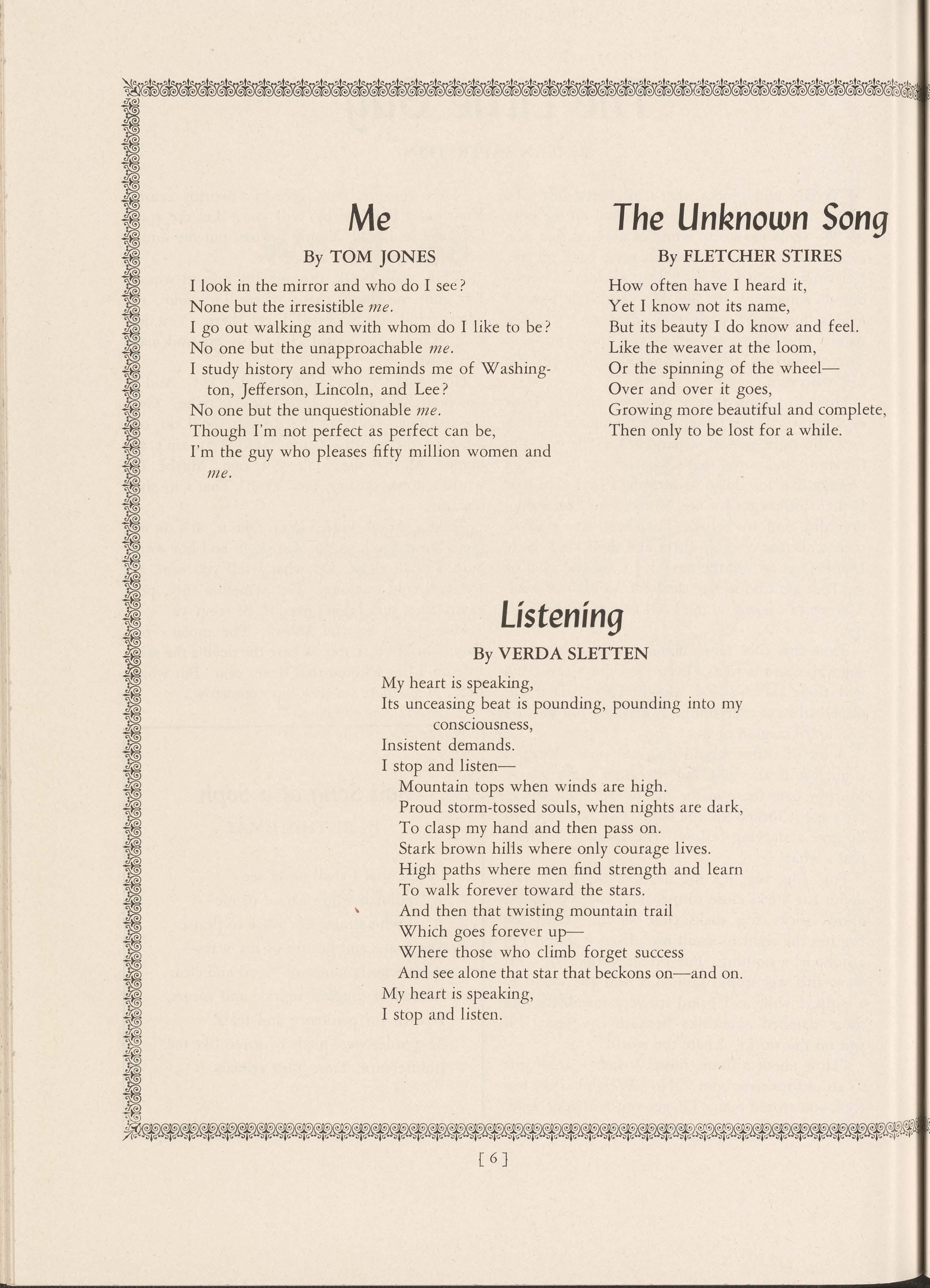
Listening
By VERDA SLETTEN
My heart is speaking, Its unceasing beat is pounding, pounding into my consoousness, Insistent demands.
I stop and listen-
Mountain tops when winds are high. Proud storm-tossed souls, when nights are dark, To clasp my hand and then pass on. Stark brown hills where only courage lives. High paths where men find strength and learn To walk forever toward the stars. And then that twisting mountain trail
Which goes forever upWhere those who climb forget success And see alone that star that beckons on-and on.
My heart is speaking, I stop and listen.
Two by Two
By VERDA SLETTEN
Two by two
The animals went Into the ark-
Ma le and female -
Tw o by two.
Tw o by two-
Ma le and femaleAlways-and especially in spring.
But I am all alone
And very tired of being one In a world where people go
Two by two

Escape
By MARGARET C. CLARK
No man can long escape the wicked darkly gleaming sword of sudden death.
Although he lives in peace and moves with simple ease from day to night-from youth to age; yet must he some day feel the stab of destiny. It strikes the young , the gay, the youths whom life has kissed full square upon the lips. It mows the scarce-ripe wheat and leaves a scar of barren stubble for the grass to heal.
But though man holds with eagerness to life, he cannot close his eyes to blot the shadow of the sword across the sun; for of a certainty, the light will one day dawn upon his heart's blood streaming silently into the greedy earthhis own blood, or his son's. No man can long escape.
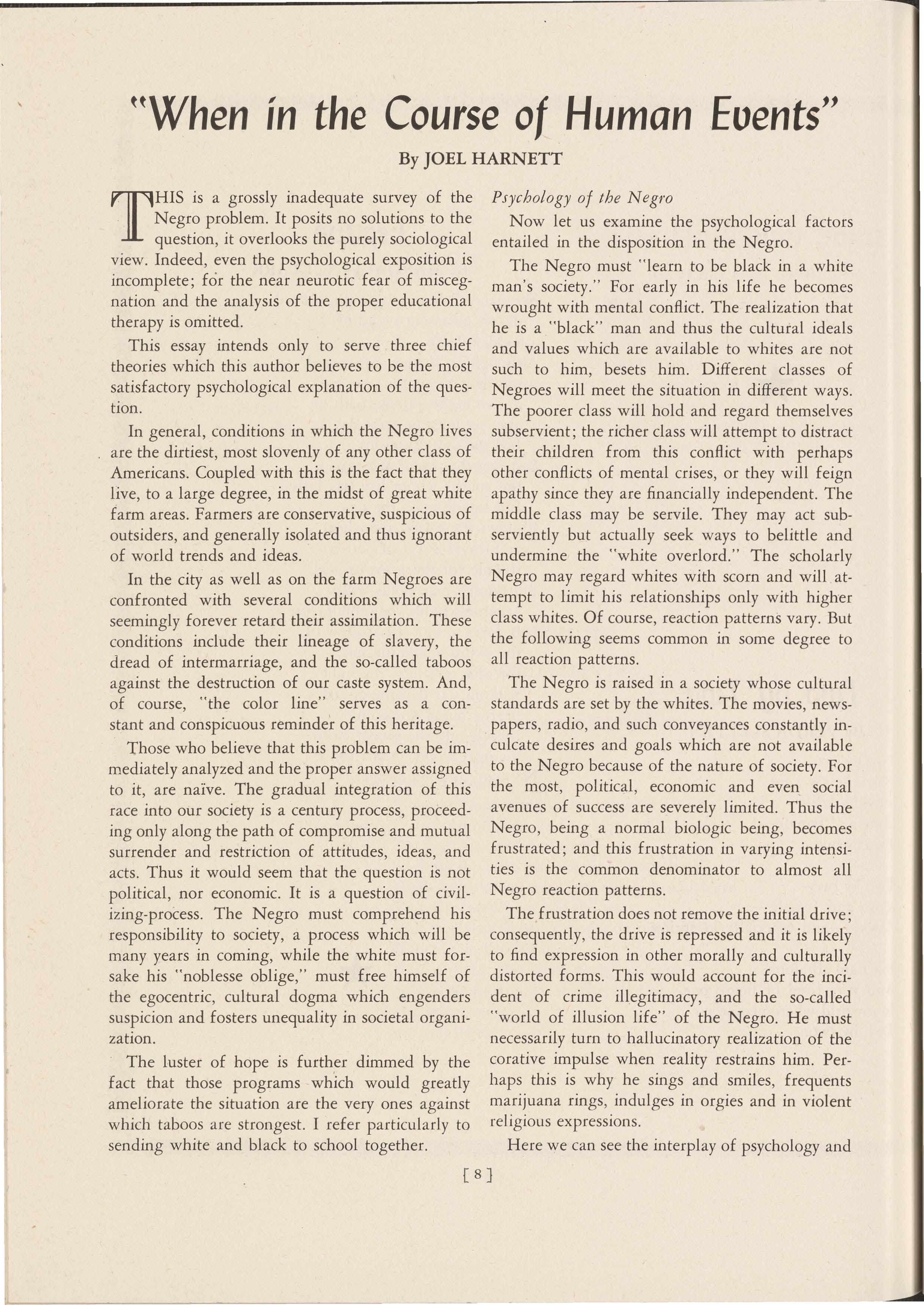
HWhenin the Courseof HumanEvents"
By JOEL HARNETT
THIS is a grossly inadequate survey of the Negro problem. It posits no solutions to the question, it overlooks the purely sociological view. Indeed, even the psychological exposition is incomplete; for the near neurotic fear of miscegnation and the analysis of the proper educational therapy is omitted
This essay intends only to serve three chief theories which this author believes to be the most satisfactory psychological explanation of the question.
In general, conditions in which the Negro lives are the dirtiest, most slovenly of any other class of Americans. Coupled with this is the fact that they live, to a large degree, in the midst of great white farm areas. Farmers are conservative, suspicious of outsiders, and generally isolated and thus ignorant of world trends and ideas
In the city as well as on the farm Negroes are confronted with several conditions which will seemingly forever retard their assimilation. These conditions include their lineage of slavery, the dread of intermarriage, and the so-called taboos against the destruction of our caste system. And , of course, "the color line" serves as a constant and conspicuous reminder of this heritage.
Those who believe that this problem can be immediately analyzed and the proper answer assigned to it , are na1ve. The gradual integration of this race into our society is a century process, proceeding only along the path of compromise and mutual surrender and restriction of attitudes, ideas, and acts. Thus it would seem that the question is not political, nor economic. It is a question of civilizing-process. The Negro must comprehend his responsibility to society, a process which will be many years in coming, while the white must forsake his "noblesse oblige," must free himself of the egocentric, cultural dogma which engenders suspicion and fosters unequality in societal organization.
The luster of hope is further dimmed by the fact that those programs which would greatly ameliorate the situation are the very ones against which taboos are strongest. I refer particularly to sending white and black to school together.
Psychology of the Negro
Now let us examine the psychological factors entailed in the disposition in the Negro.
The Negro must "learn to be black in a white man's society." For early in his life he becomes wrought with mental conflict. The realization that he is a "black " man and thus the cultural ideals and values which are available to whites are not such to him, besets him. Different classes of Negroes will meet the situation in different ways. The poorer class will hold and regard themselves subservient; the richer class will attempt to distract their children from this conflict with perhaps other conflicts of mental crises, or they will feign apathy since they are financially independent. The middle class may be servile. They may act subserviently but actually seek ways to belittle and undermine the "white overlord." The scholarly Negro may regard whites with scorn and will attempt to limit his relationships only with higher class whites. Of course, reaction patterns vary. But the following seems common in some degree to all reaction patterns.
The Negro is raised in a society whose cultural standards are set by the whites. The movies, newspapers, radio, and such conveyances constantly inculcate desires and goals which are not available to the Negro because of the nature of society. For the most, political, economic and even social avenues of success are severely limited. Thus the Negro, being a normal biologic being, becomes frustrated; and this frustration in varying intensities is the common denominator to almost all Negro reaction patterns.
The frustration does not remove the initial drive; consequently, the drive is repressed and it is likely to find expression in other morally and culturally distorted forms . This would account for the incident of crime illegitimacy, and the so-called "world of illusion life" of the Negro. He must necessarily turn to hallucinatory realization of the corative impulse when reality restrains him. Perhaps this is why he sings and smiles, frequents marijuana rings, indulges in orgies and in violent religious expressions.
Here we can see the interplay of psychology and
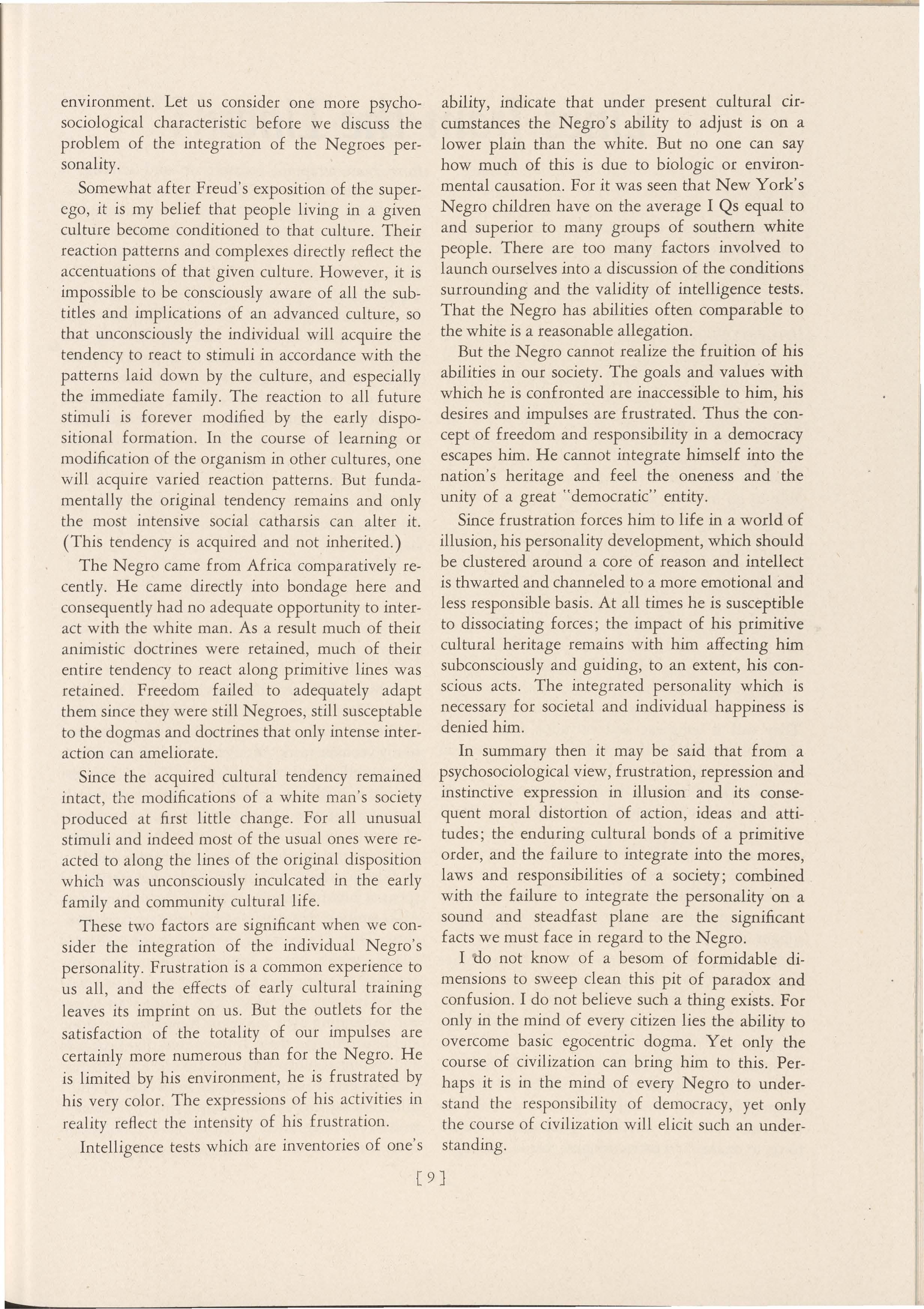
environment. Let us consider one more psychosociological characteristic before we discuss the problem of the integration of the Negroes personality.
Somewhat after Freud's exposition of the superego, it is my belief that people living in a given culture become conditioned to that culture. Their reaction patterns and complexes directly reflect the accentuations of that given culture. However, it is impossible to be consciously aware of all the subtitles and implications of an advanced culture, so that unconsciously the individual will acquire the tendency to react to stimuli in accordance with the patterns laid down by the culture, and especially the immediate family. The reaction to all future stimuli is forever modified by the early dispositional formation. In the course of learning or modification of the organism in other cultures, one will acquire varied reaction patterns. But fundamentally the original tendency remains and only the most intensive social catharsis can alter it. (This tendency is acquired and not inherited.)
The Negro came from Africa comparatively recently. He came directly into bondage here and consequently had no adequate opportunity to interact with the white man. As a result much of their animistic doctrines were retained, much of their entire tendency to react along primitive lines was retained. Freedom failed to adequately adapt them since they were still Negroes, still susceptable to the dogmas and doctrines that only intense interaction can ameliorate.
Since the acquired cultural tendency remained intact, the modifications of a white man's society produced at first little change. For all unusual stimuli and indeed most of the usual ones were reacted to along the lines of the original disposition which was unconsciously inculcated in the early family and community cultural life.
These two factors are significant when we consider the integration of the individual Negro's personality. Frustration is a common experience to us all, and the effects of early cultural training leaves its imprint on us. But the outlets for the satisfaction of the totality of our impulses are certainly more numerous than for the Negro. He is limited by his environment, he is frustrated by his very color The expressions of his activities in reality reflect the intensity of his frustration.
Intelligence tests which are inventories of one's
[9]
ability, indicate that under present cultural circumstances the Negro's ability to adjust is on a lower plain than the white. But no one can say how much of this is due to biologic or environmental causation. For it was seen that New York's Negro children have on the average I Qs equal to and superior to many groups of southern white people. There are too many factors involved to launch ourselves into a discussion of the conditions surrounding and the validity of intelligence tests. That the Negro has abilities often comparable to the white is a reasonable allegation.
But the Negro cannot realize the fruition of his abilities in our society. The goals and values with which he is confronted are inaccessible to him, his desires and impulses are frustrated. Thus the concept of freedom and responsibility in a democracy escapes him. He cannot integrate himself into the nation's heritage and feel the oneness and the unity of a great "democratic" entity.
Since frustration forces him to life in a world of illusion, his personality development, which should be clustered around a core of reason and intellect is thwarted and channeled to a more emotional and less responsible basis. At all times he is susceptible to dissociating forces; the impact of his primitive cultural heritage remains with him affecting him subconsciously and guiding, to an extent, his conscious acts. The integrated personality which is necessary for societal and individual happiness is denied him.
In summary then it may be said that from a psychosociological view, frustration, repression and instinctive expression in illusion and its consequent moral distortion of action, ideas and attitudes; the enduring cultural bonds of a primitive order, and the failure to integrate into the mores, laws and responsibilities of a society; combined with the failure to integrate the personality on a sound and steadfast plane are the significant facts we must face in regard to the Negro.
I do not know of a besom of formidable dimensions to sweep clean this pit of paradox and confusion. I do not believe such a thing exists. For only in the mind of every citizen lies the ability to overcome basic egocentric dogma. Yet only the course of civilization can bring him to this. Perhaps it is in the mind of every Negro to understand the responsibility of democracy, yet only the course of civilization will elicit such an understanding.
Linesfromthe Lines
France.
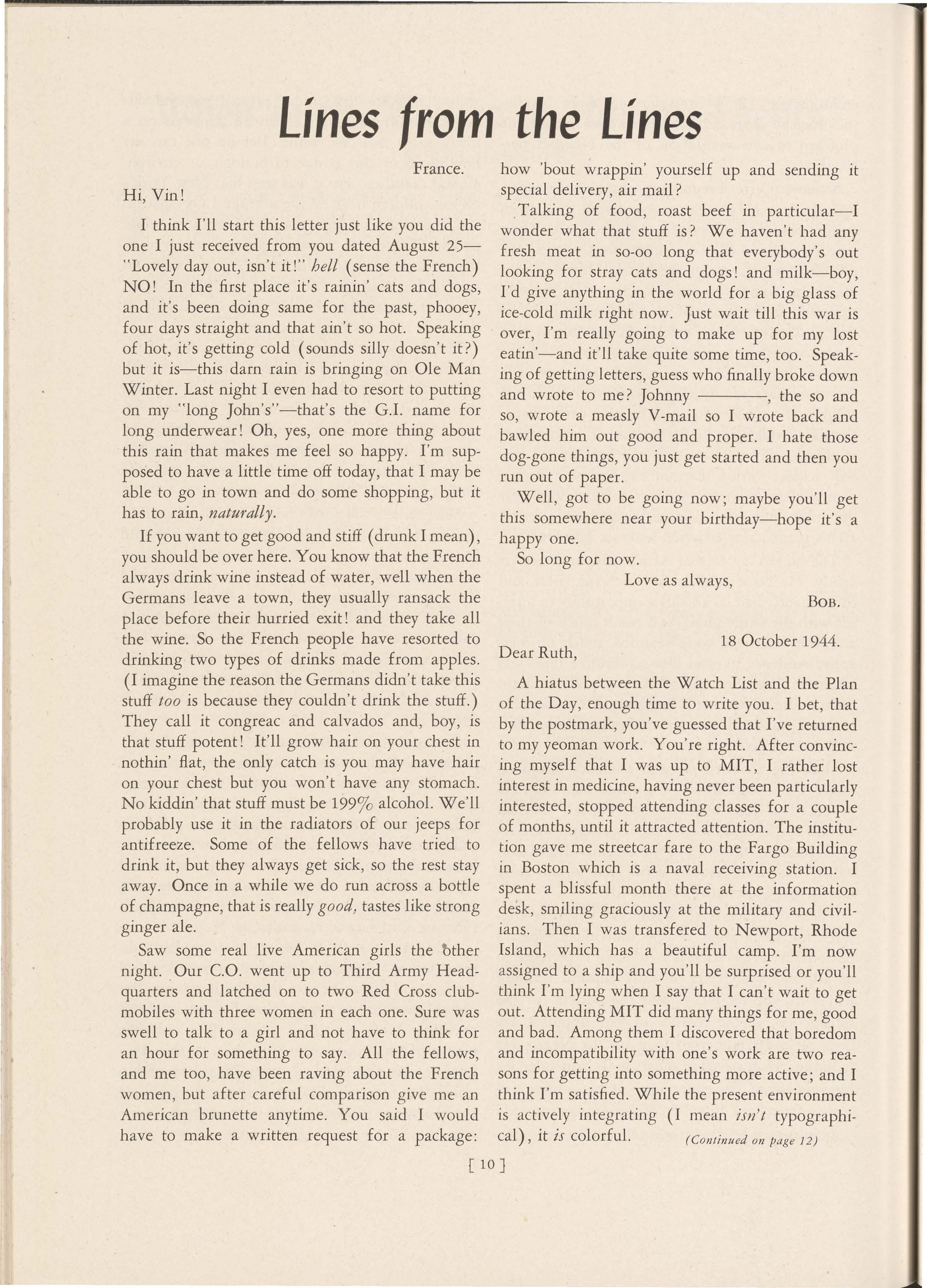
Hi, Vin!
I think I'll start this letter just like you did the one I just received from you dated August 25"Lovely day out, isn't it!" hell (sense the French) NO! In the first place it's rainin' cats and dogs, and it's been doing same for the past, phooey, four days straight and that ain ' t so hot. Speaking of hot, it's getting cold (sounds silly doesn't it?) but it is-this darn rain is bringing on Ole Man Winter. Last night I even had to resort to putting on my "long John's"-that' s the G.I. name for long underwear! Oh, yes, one more thing about this rain that makes me feel so happy. I'm supposed to have a little time off today, that I may be able to go in town and do some shopping, but it has to rain, naturally.
If you want to get good and stiff ( drunk I mean), you should be over here You know that the French always drink wine instead of water, well when the Germans leave a town, they usually ransack the place before their hurried exit! and they take all
how 'bout wrappin' yourself up and sending it special delivery, air mail?
.Talking of food, roast beef in particular-I wonder what that stuff is? We haven't had any fresh meat in so-oo long that everybody's out looking for stray cats and dogs! and milk-boy, I'd give anything in the world for a big glass of ice-cold milk right now. Just wait till this war is over, I'm really going to make up for my lost eatin'-and it'll take quite some time, too. Speaking of getting letters, guess who finally broke down and wrote to me? Johnny ----, the so and so, wrote a measly V-mail so I wrote back and bawled him out good and proper. I hate those dog-gone things, you just get started and then you run out of paper.
Well, got to be going now; maybe you'll get this somewhere near your birthday-hope it ' s a happy one.
So long for now.
Love as always, BOB.
the wine. So the French people have resorted to k d f 1 Dear Ruth, drinking two types of drin s ma e rom app es
18 October 1944. (I imagine the reason the Germans didn't take this A hiatus between the Watch List and the Plan stuff too is because they couldn't drink the stuff.) of the Day, enough time to write you. I bet, that They call it congreac and calvados and , boy, is by the postmark, you've guessed that I've returned that stuff potent! It'll grow hair on your chest in to my yeoman work. You' re right. After convincnothin' flat, the only catch is you may have hair ing myself that I was up to MIT, I rather lost on your chest but you won't have any stomach. interest in medicine, having never been particularly No kiddin' that stuff must be 199 % alcohol. We'll interested, stopped attending classes for a couple probably use it in the radiators of our jeeps for of months, until it attracted attention. The instituantifreeze. Some of the fellows have tried to tion gave me streetcar fare to the Fargo Building drink it, but they always get sick, so the rest stay in Boston which is a naval receiving station. I away. Once in a while we do run across a bottle spent a blissful month there at the information of champagne, that is really good, tastes like strong desk, smiling graciously at the military and civilginger ale. ians. Then I was transfered to Newport, Rhode Saw some real live American girls the t)ther Island, which has a beautiful camp. I'm now night. . Our C.O. went up to Third Army Head- assigned to a ship and you ' ll be surprised or you'll quarters and latched on to two Red Cross club- think I'm lying when I say that I can't wait to get mobiles with three women in each one. Sure was out. Attending MIT did many things for me, good swell to talk to a girl and not have to think for and bad. Among them I discovered that boredom an hour for something to say. All the fellows, and incompatibility with one's work are two reaand me too, have been raving about the French sons for getting into something more active; and I women , but after careful comparison give me an think I'm satisfied . While the present environment American brunette anytime. You said I would is actively integrating (I mean isn ' t typographihave to make a written request for a package: cal), it is colorful. (C ontinued on p age 12)
[ 10)
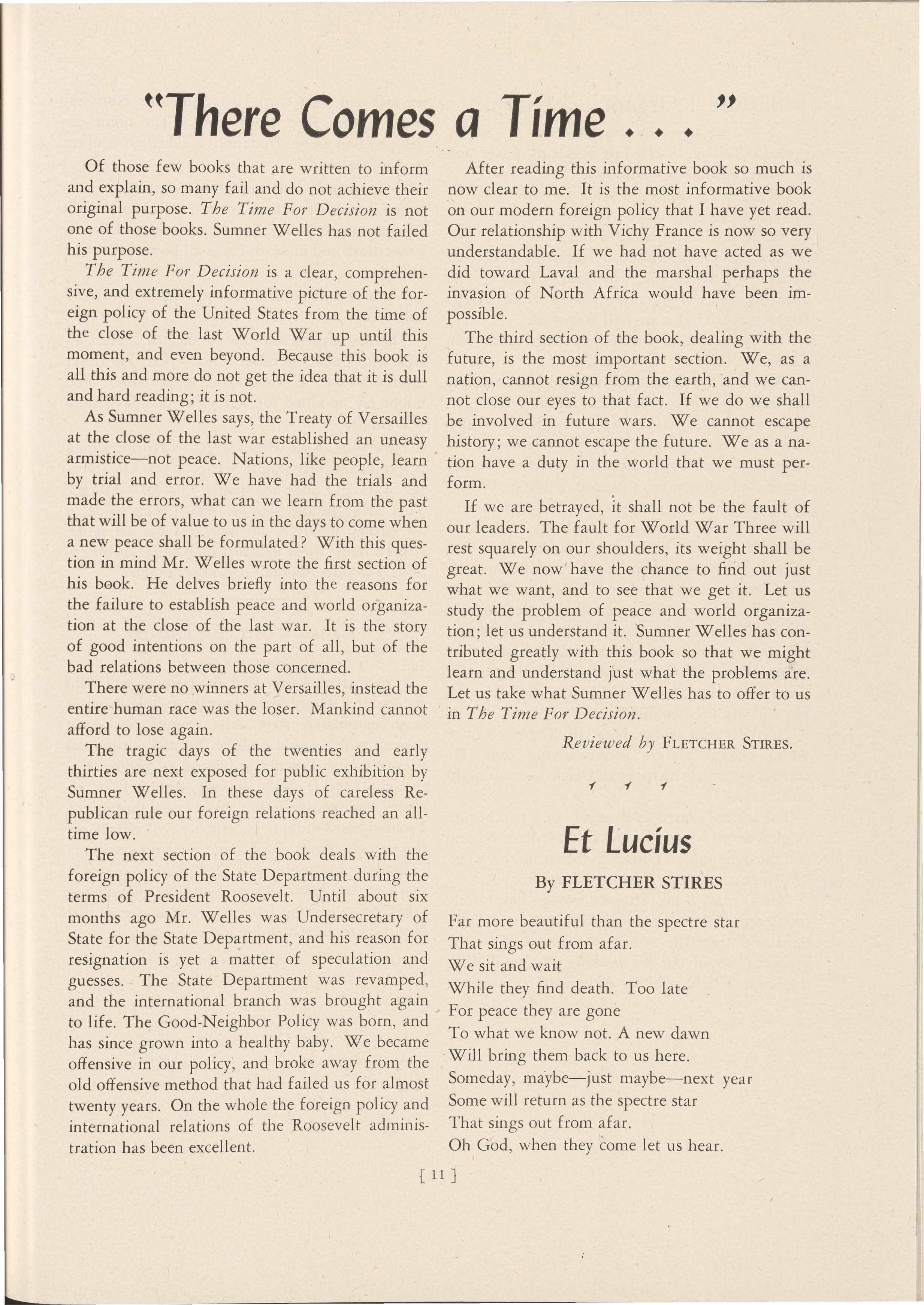
~~ThereComesa Time. ,, • •
Of those few books that are written to inform and explain, so many fail and do not achieve their original purpose. Th e Time For D ecision is not one of those books. Sumner Welles has not failed his purpose .
The Time For Decision is a clear, comprehensive, and extremely informative picture of the foreign policy of the United States from the time of the close of the last World War up until this moment , and even beyond. Because this book is all this and more do not get the idea that it is dull and hard reading; it is not.
As Sumner Welles says, the Treaty of Versailles at the close of the last war established an uneasy armistice-not peace. Nations , like people, learn by trial and error. We have had the trials and made the errors, what can we learn from the past that will be of value to us in the days to come when a new peace shall be formulated? With this question in mind Mr. Welles wrote the first section of his beok. He delves briefly into th e reasons for the failure to establish peace and world organization at the close of the last war. It is the story of good intentions on the part of all, but of the bad relations between those concerned.
There were no winners at Versailles, instead the entire human race was the loser. Mankind cannot afford to lose again.
The tragic days of the twenties and early thirties are next exposed for public exhibition by Sumner Well es . In these days of careless Republican rule our foreign relations reached an alltime low.
The next section of the book deals with the foreign policy of the State Department during the terms of President Roosevelt. Until about six months ago Mr. Welles was Undersecretary of State for the State Department, and his reason for resignation is yet a matter of speculation and guesses. The State Department was revamped , and the international branch was brought again to life. The Good-Neighbor Policy was born, and has since grown into a healthy baby . We became offensive in our policy , and broke away from the old offensive method that had failed us for almost twenty years. On the whole the foreign policy and international relations of the Roosevelt administration has been excellent.
After reading this informative book so much is now clear to me. It is the most informative book on our modern foreign policy that I have yet read. Our relationship with Vichy France is now so very understandable. If we had not have acted as we did toward Laval and the marshal perhaps the invasion of North Africa would have been impossible.
The third section of the book, dealing with the future, is the most important section. We, as a nation, cannot resign from the earth, and we cannot close our eyes to that fact. If we do we shall be involved in future wars. We cannot escape history; we cannot escape the future. We as a nation have a duty in the world that we must perform.
If we are betrayed, it shall not be the fault of our leaders. The fault for World War Three will rest squarely on our shoulders, its weight shall be great. We now ' have the chance to find out just what we want, and to see that we get it. Let us study the problem of peace and world organization; let us understand it. Sumner Welles has contributed greatly with this book so that we might learn and understand just what the problems are. Let us take what Sumner Well es has to offer to us in The Time For Decision.
Reviewed by FLETCHER STIRES. -f -f -f
Et Lucius
By FLETCHER STIRES
Far more beautiful than the spectre star
That sings out from afar. We sit and wait
While they find death. Too late For peace they are gone
To what we know not. A new dawn Will bring them back to us here. Someday , ma ybe-just maybe-next year
Some will return as the spectre star That sings out from afar.
Oh God , when they come let us hear. [ 11 ]
Should I Organize a Union?
(Continued f1'0m page 3) rasped. "Tell me!" His lips began to quiver and he wrung his hands vigorously.
"Why, it was white," I said.
"White--are you sure--white ?"
"Quite sure. Is anything wrong?"
"Wrong, wrong, why " suddenly he quieted himself. "Forgive me," he said . "Fellow, you probably think I'm crazy. Maybe I am. Dogs frighten me. They scare hell out of me."
"Many people are afraid of dogs, cats, too. That's not unusual," I replied.
"You don't understand. I hate dogs because they are tied up with, well, with murder. Stranger, there was a murder here last year. There was one here two years ago and there was one here three years ago." His words effused in torrents. He was a man confessing a sin, a passion, a tale, and it was an incredulous tale. Incoherently, he raved on.
"They never caught the murderers of each of them. They said they were suicides. But they weren't. They were murders. I know because my own brother was murdered. Heart attack, they said. Heart attack. He was killed, killed by that maniac. There are not many that know of him. But I know that when that asylum in back of the river burned down all the maniacs didn't die. One of them lived. He swore he'd kill my brother. He did. He did. My brother didn ' t die."
"He kills with an axe . He's tall. There is a huge white animal always accompanying him. He corners somebody he hates and hacks them at night and ."
The torrent ceased as strangely as it had begun. A glowworm wicked by the side of the road and still the light made a fantasy in the trembling pines.
"The man seems clever," I whispered.
" He's mad," his strained voice desperately countered. "I turn off here." He took out a flashlight and tried the switch. A beam fell on the ground. " Ah , at last it's working," he said. With the beam of light pointing downward he turned to
me and said: 'Tm sorry I acted like this. Nervousness, I guess. Too much work." The night enveloped him as he strode into a side-path leading to another road.
I stood still, contemplating what had happened. I had felt no fear. For you see I had already felt the unity of death. I was a messenger of death. I was death and in death I was all-powerful. I was almighty.
I wheeled about and took the path my friend had taken.
The newspapers said that he died of a heart attack while walking home from work. He never uttered a word. It was a quiet simple affair. You might say he killed himself-sort of talked himself into it.
Now you can see what I object to. Killing a man is a comparatively simple matter if you are a genius. Axes and dogs are strictly amateur creations They make people lose the real human value in my efforts. Really, I am hurt; for my art is destroyed midst these figments of popular misinceptions. I wonder, should I organize a union?
Lines from the Lines
(Continued from page 3)
I really don't know what the postwar will hold for me. If I should lose a couple of limbs I can at least legitimately start selling pencils on street corners, which would probably be more substantial than anything I would ordinarily undertake. I've thought a great deal , and experiences have revealed some prospects, but still there is uncertainty. I sometimes wonder if uncertainty will pursue m e through my sixties. Pardon me , am I dramatizing,
Be sure and write, will you? Letters mean so much to the "boys." Unsarcastically, I would certainly enjoy hearing from you, and it is true that letters do mean something in these camps.
Very sincerely,
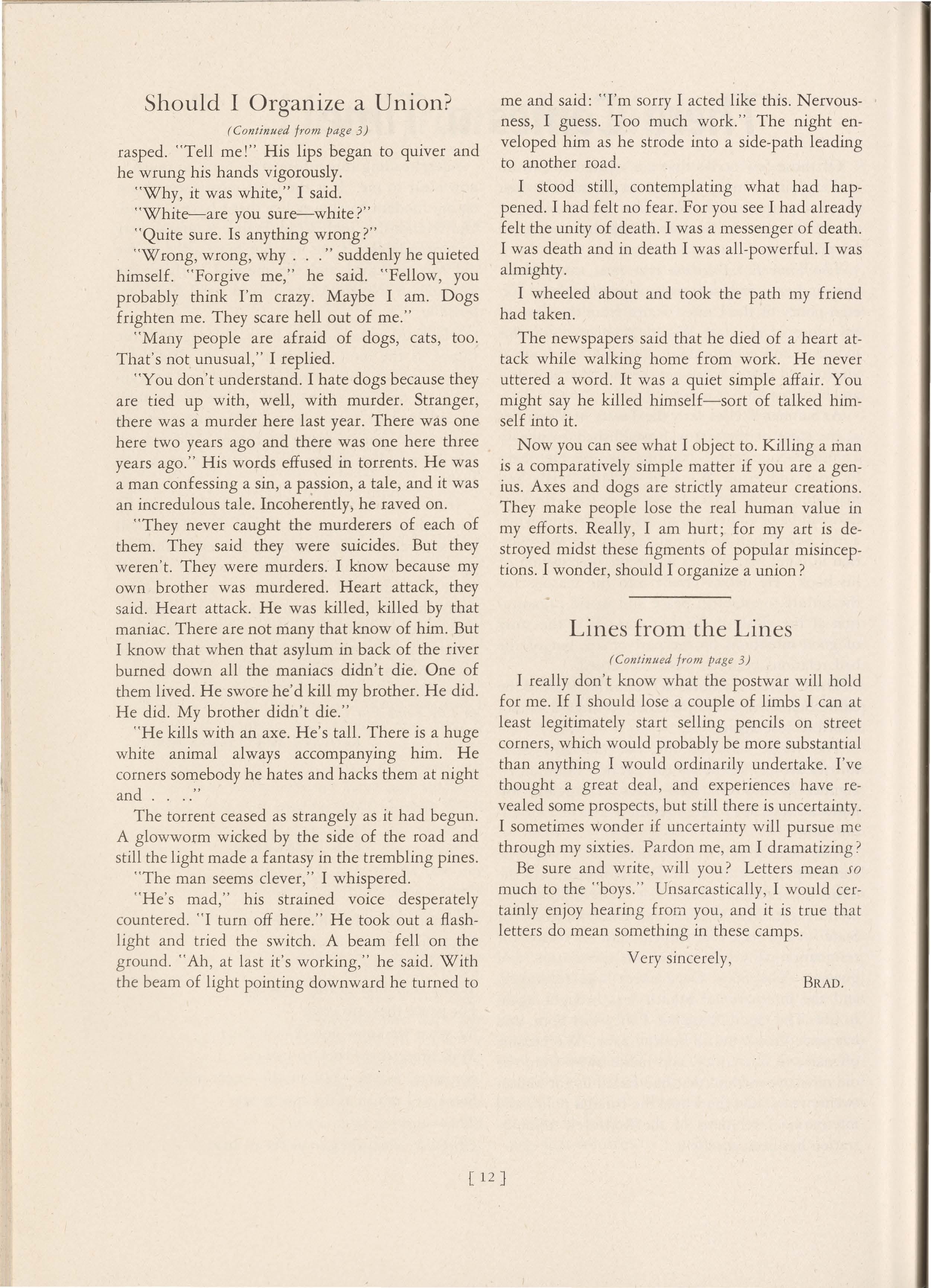
BRAD

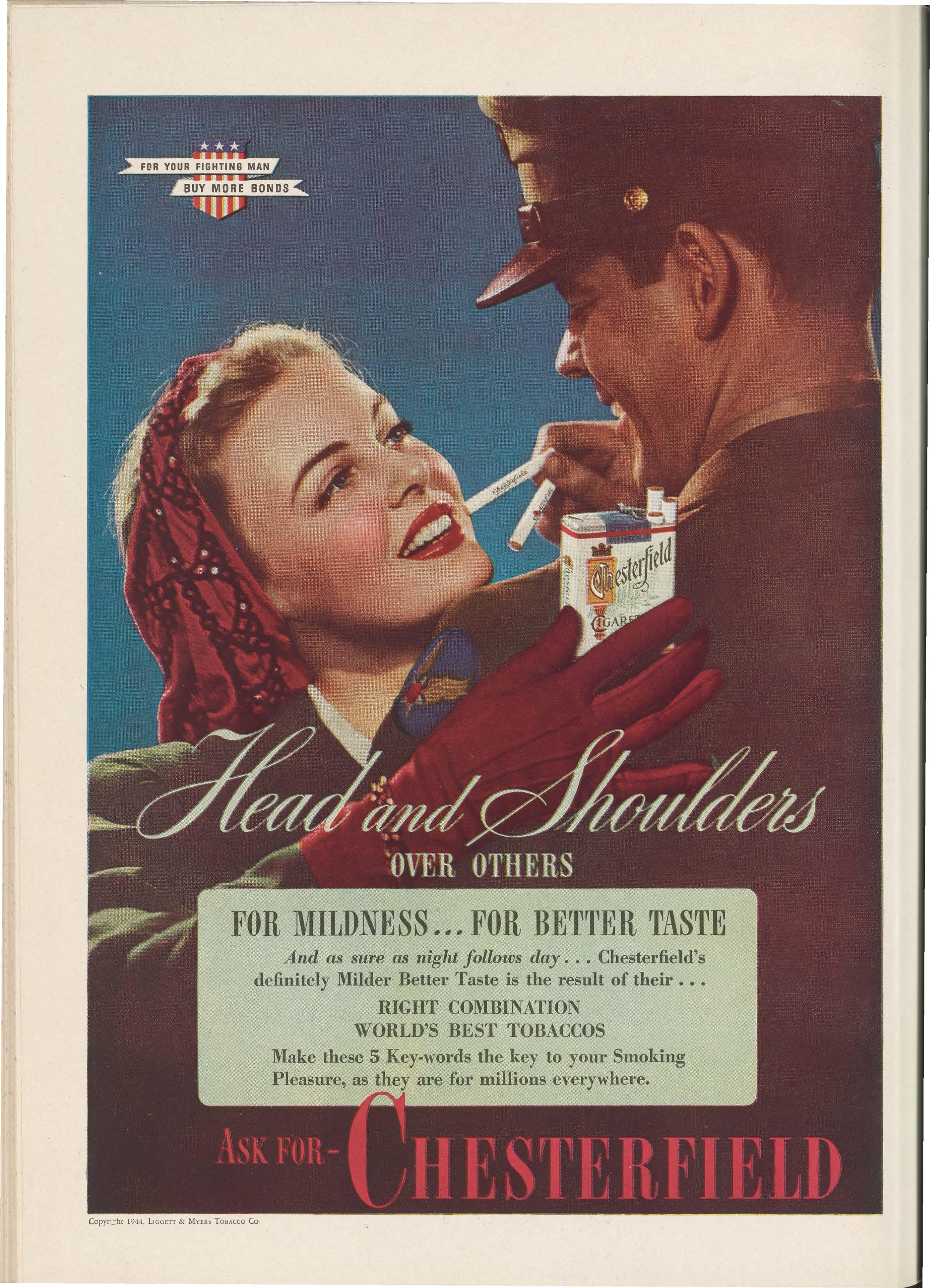
FORMILDNESS ... FORBETTERTASTE
And as sure as night follows day . .. Chesterfield's definitely Milder Better Taste is the result of their •••
RIGHT COMBINATION WORLD'S BEST TOBACCOS . Make these 5 Key-words the key to your Smoking Pleas .ure, as they are for millions everywhere.
Copyr·_:ht 1944, L1GGETT& MYERS ToaAcco Co
